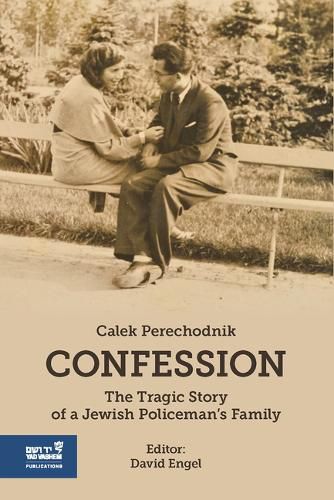Readings Newsletter
Become a Readings Member to make your shopping experience even easier.
Sign in or sign up for free!
You’re not far away from qualifying for FREE standard shipping within Australia
You’ve qualified for FREE standard shipping within Australia
The cart is loading…






The haunting wartime diary of a Jewish policeman and his tragic fate.
Calek Perechodnik (1916-1944), a Polish Jew from the town of Otwock near Warsaw, found himself in unimaginable circumstances during the German occupation. In February 1941, he joined the Jewish Ghetto Police in Otwock, believing it would protect him and his family from deportation. However, in August 1942, during a mass deportation of the town's Jews, Perechodnik personally handed over his wife Anna and daughter Atlit to the Germans--convinced, tragically, that it would spare them. They were murdered in Treblinka.
Wracked with guilt, Perechodnik went into hiding in the "Aryan" part of Warsaw in early 1943. Between May and August of that year, he composed a haunting, introspective diary--a confession and an unflinching account of complicity, grief, and moral reckoning. Dedicated to his lost wife and child, the diary also offers rare insights into life in hiding, the strained dynamics between Jews and their Polish rescuers, and the psychological toll of survival.
In August 1944, Perechodnik joined the Polish resistance (Armia Krajowa) during the Warsaw Uprising but fell ill with typhus. After the uprising's failure, he was either murdered by looters or took his own life.
After the war, his brother Pesach--the family's sole survivor--recovered the first part of the diary and a testament written during the uprising. This diary is among the most important and disturbing documents to emerge from the Holocaust. Its historical significance lies not only in its raw moral complexity, but also in its rare perspective: a voice from within the Jewish Ghetto Police--an account at once deeply personal and universally unsettling. Thanks to historian Prof. David Engel's rigorous scholarship, this new English edition of Perechodnik's diary now stands as a vital contribution to Holocaust historiography, Jewish memory, and our understanding of the choices faced by individuals under totalitarian terror.
$9.00 standard shipping within Australia
FREE standard shipping within Australia for orders over $100.00
Express & International shipping calculated at checkout
Stock availability can be subject to change without notice. We recommend calling the shop or contacting our online team to check availability of low stock items. Please see our Shopping Online page for more details.
The haunting wartime diary of a Jewish policeman and his tragic fate.
Calek Perechodnik (1916-1944), a Polish Jew from the town of Otwock near Warsaw, found himself in unimaginable circumstances during the German occupation. In February 1941, he joined the Jewish Ghetto Police in Otwock, believing it would protect him and his family from deportation. However, in August 1942, during a mass deportation of the town's Jews, Perechodnik personally handed over his wife Anna and daughter Atlit to the Germans--convinced, tragically, that it would spare them. They were murdered in Treblinka.
Wracked with guilt, Perechodnik went into hiding in the "Aryan" part of Warsaw in early 1943. Between May and August of that year, he composed a haunting, introspective diary--a confession and an unflinching account of complicity, grief, and moral reckoning. Dedicated to his lost wife and child, the diary also offers rare insights into life in hiding, the strained dynamics between Jews and their Polish rescuers, and the psychological toll of survival.
In August 1944, Perechodnik joined the Polish resistance (Armia Krajowa) during the Warsaw Uprising but fell ill with typhus. After the uprising's failure, he was either murdered by looters or took his own life.
After the war, his brother Pesach--the family's sole survivor--recovered the first part of the diary and a testament written during the uprising. This diary is among the most important and disturbing documents to emerge from the Holocaust. Its historical significance lies not only in its raw moral complexity, but also in its rare perspective: a voice from within the Jewish Ghetto Police--an account at once deeply personal and universally unsettling. Thanks to historian Prof. David Engel's rigorous scholarship, this new English edition of Perechodnik's diary now stands as a vital contribution to Holocaust historiography, Jewish memory, and our understanding of the choices faced by individuals under totalitarian terror.